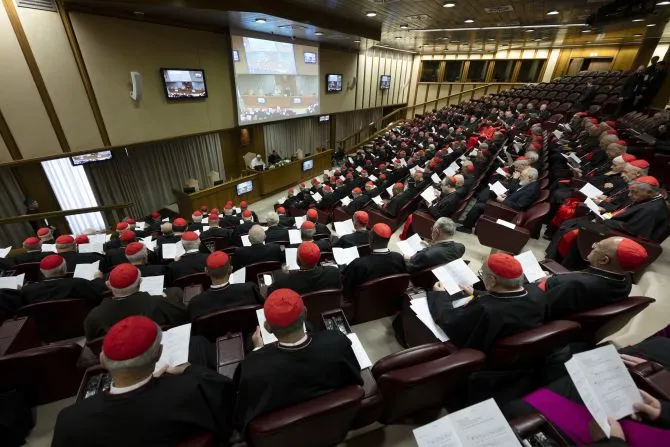The scarlet biretta is, as the pope will recite, a “sign of the dignity of the cardinalate, signifying your readiness to act with courage, even to the shedding of your blood, for the increase of the Christian faith, for the peace and tranquility of the people of God and for the freedom and growth of the Holy Roman Church.”
Immediately before, the new cardinals will make a profession of faith by reciting the Creed. They then pronounce an oath of fidelity and obedience to the pope and his successors.
The pope will also assign each new cardinal a church in the Diocese of Rome, called a “titular church.” This further links the cardinal to Rome and to the pope, who is the bishop of Rome.
The other members of the College of Cardinals, clergy, Catholics, and members of the public may all attend a consistory to create cardinals.
So, how many cardinals will there be, and why does it matter?
(Story continues below)
St. Paul VI established in 1970 that cardinals aged 80 and over cannot participate in the process of electing a pope — thus, cardinals who are younger than 80 are known as “electors.” Paul VI also established a numerical limit for the number of electors, capping it at 120, but the number occasionally has risen above that number.
The number of cardinal electors — and indeed the number of cardinals in general — in the college is always changing, since at any time cardinals may be celebrating their 80th birthday or may have died.
According to the Vatican, as of Sept. 29, there were 119 cardinal electors ahead of the consistory and 102 non-electors. After the consistory, the number will rise to 105 non-electors and 136 electors.
Francis has shaped the college greatly during his 10 years as pope, appointing 98, or 72%, of the current electors after the conclave on Sept. 30. The rest were appointed by St. John Paul II and Pope Benedict XVI. In all, he has named cardinals from 66 countries, including several first-time nations, such as South Sudan, Singapore, and Mongolia.
That percentage becomes important given the current requirement that a candidate needs a two-thirds majority of the cardinals’ votes to be elected pope. This, however, is a provision that Pope Francis could change at any time.
Jonah McKeown is a staff writer and assistant podcast producer for Catholic News Agency. He holds a Master’s Degree from the University of Missouri School of Journalism and in the past has worked as a writer, as a producer for public radio, and as a videographer.








